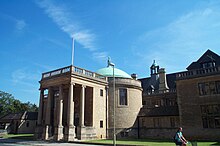
Back Rhodes-beurs Afrikaans منحة رودس Arabic Стыпендыя Родса Byelorussian রোডস বৃত্তি Bengali/Bangla Rhodes-Stipendium German Stipendio Rhodes Esperanto Rhodesi stipendium Estonian بورسیه رودز Persian Rhodes-stipendi Finnish Bourse Rhodes French
| Rhodes Scholarship | |
|---|---|
 Rhodes House at the University of Oxford | |
| Awarded for | Postgraduate study at the University of Oxford |
| Sponsored by | Rhodes Trust |
| Location | Oxford, England |
| Established | 1902 |
| Website | www |
The Rhodes Scholarship is an international postgraduate award for students to study at the University of Oxford in Oxford, United Kingdom. The scholarship is open to people from all backgrounds around the world.[1]
Established in 1902, it is one of the oldest graduate scholarships in the world and one of the most prestigious international scholarship programs.[2][3][4][5] Its founder, Cecil John Rhodes, wanted to promote unity among English-speaking nations and instill a sense of civic-minded leadership and moral fortitude in future leaders, irrespective of their chosen career paths.[6]
The scholarship committee selects candidates based on a combination of literary and academic achievements, athletic involvement, character traits like truth and courage, and leadership potential, originally assessed on a 200-point scale. In 2018, the criteria were revised to emphasize using one's talents and caring for others. The American Rhodes Scholarship is highly competitive, with an acceptance rate of around four percent in recent years, while other countries have varying rates.[7] Scholars can study full-time postgraduate courses at Oxford for one to three years, receiving financial support for tuition and living expenses, along with access to Rhodes House facilities.
The Rhodes Scholarship has faced controversies since its inception, primarily concerning the exclusion of women and Black Africans. Initially, the scholarship was limited to male students with Commonwealth of Nations, Germany, and the United States, a restriction that only changed in 1977 following the passage of the Sex Discrimination Act. Protests for the inclusion of non-white scholars began in the 1970s, but it wasn't until 1991 that Black South Africans were awarded the scholarship due to the political changes in the country. Additionally, criticism of Cecil Rhodes's colonialist legacy has spurred movements calling for a reevaluation of the scholarship and its ties to Rhodes's views. Critics have also highlighted the tendency of recipients to pursue careers in business rather than public service, diverging from the scholarship's original intent. In 2007, some criticized Oxford's postgraduate education as outdated, further igniting debate over the quality of education and the scholarship's value. [citation needed]
Rhodes Scholars have pursued diverse careers across various fields, including education, law, business, and medicine, often achieving respectable positions. Many have engaged in social justice, human rights advocacy, and civil rights work. In the medical and scientific communities, they have contributed to advancements in genetics, disease research, and surgical techniques. Notable scholars include former heads of state, a Pulitzer Prize-winning journalist, and influential activists. Additionally, some have made significant contributions to literature, arts, and technology, influencing culture and scientific understanding.
- ^ Rhodes, R. A. W. (24 August 2017). "From Prime Ministerial Power to Core Executive". Oxford Scholarship Online. 1. doi:10.1093/oso/9780198786108.003.0009.
- ^ Richard, Adams (18 February 2018). "Rhodes scholarships opened up to students from UK and rest of world". The Guardian. Retrieved 5 December 2020.
- ^ Pérez-Peña, Richard (19 February 2018). "Rhodes Scholarships Go Global as Students From Anywhere Now Qualify (Published 2018)". The New York Times. ISSN 0362-4331. Retrieved 10 December 2020.
- ^ Winerip, Michael (12 January 2003). "How to Win a Rhodes". The New York Times. The New York Times. Retrieved 5 December 2020.
- ^ Nietzel, Michael T (22 November 2020). "The 2021 Rhodes Scholars Have Been Selected; The 32 U.S. Winners Are Among The Most Diverse Ever". Forbes. Retrieved 5 December 2020.
- ^ Cecil Rhodes & William Thomas Stead (1902). The last will and testament of Cecil John Rhodes: with elucidatory notes to which are added some chapters describing the political and religious ideas of the testator. "Review of Reviews" Office.
- ^ Nietzel, Michael T. "32 U.S. Students Among The 2025 Rhodes Scholarship Recipients". Forbes. Retrieved 13 December 2024.